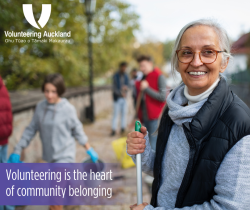Volunteering as the Heart of Community Belonging

Volunteering is a powerful tool for building and sustaining a sense of belonging within communities. In New Zealand, where the concept of community is deeply embedded in the cultural fabric. Volunteering plays a crucial role in fostering social cohesion, promoting inclusivity, and strengthening the bonds between individuals and their communities. This article explores the various benefits of volunteering in creating a sense of belonging, highlighting how this collective effort not only enhances individual well-being but also contributes to the overall health and resilience of communities.
Volunteering as a Pathway to Connection and Inclusion
One of the most significant benefits of volunteering is its ability to connect people from diverse backgrounds and experiences. In New Zealand, which is home to a multicultural population, volunteering provides a unique opportunity for individuals to come together around shared goals and values. Whether through local community centres, environmental groups, or social service organisations, volunteering enables people to engage with others in a meaningful way, breaking down barriers and fostering a sense of inclusion.
For newcomers to New Zealand, such as immigrants and refugees, volunteering can be an essential pathway to integrating into the community. It offers a chance to meet new people, learn about the local culture, and contribute to society in a positive way. This sense of contribution and connection is vital in helping newcomers feel welcomed and valued, thereby enhancing their sense of belonging.
Volunteering also plays a crucial role in bridging generational gaps. In many New Zealand communities, older adults volunteer alongside younger generations, sharing their knowledge, skills, and life experiences. This intergenerational exchange not only strengthens community ties but also fosters mutual respect and understanding, creating a more cohesive and supportive environment for all.
Strengthening Community Identity and Pride
Volunteering contributes to the development of a strong community identity and pride. When individuals volunteer, they invest their time, energy, and resources into the betterment of their community. This collective effort leads to tangible outcomes, such as cleaner parks, restored historical sites, and well-organised community events, which in turn foster a sense of pride and ownership among community members.
In New Zealand, volunteering is often tied to local traditions, cultural practices, and environmental stewardship. For example, many Māori and Pasifika communities engage in volunteering as an expression of manaakitanga (hospitality) and kaitiakitanga (guardianship of the environment). By participating in community-led initiatives, individuals contribute to the preservation and promotion of their cultural heritage, reinforcing their connection to their roots and to each other.
The sense of pride that comes from contributing to the community can also have a ripple effect, inspiring others to get involved and take ownership of their surroundings. This collective pride strengthens the community’s identity and helps to build a resilient, self-reliant society where everyone feels a sense of belonging.
Enhancing Mental and Emotional Well-Being
The act of volunteering has been shown to have numerous mental and emotional health benefits, contributing to a greater sense of well-being and life satisfaction. In New Zealand, where issues such as social isolation and mental health challenges are increasingly prevalent, volunteering offers a valuable antidote.
Volunteering provides individuals with a sense of purpose and fulfilment, which is crucial for mental well-being. The act of giving back to the community and seeing the positive impact of one’s efforts can lead to increased self-esteem and a sense of accomplishment. This, in turn, enhances overall happiness and life satisfaction.
Moreover, volunteering can help combat feelings of loneliness and isolation. By participating in group activities and working alongside others towards a common goal, volunteers build social networks and form meaningful relationships. These connections are vital in creating a sense of community and belonging, which are essential for mental and emotional health.
For many people, volunteering also serves as a form of stress relief. Engaging in activities that align with one’s values and passions can provide a break from the pressures of everyday life, offering a chance to focus on positive, constructive work. This can lead to improved mental clarity, reduced anxiety, and a greater sense of inner peace.
Empowering Individuals and Communities
Volunteering is a powerful tool for empowerment, both for individuals and for the communities they serve. In New Zealand, where the concept of mana (power and authority) is deeply embedded in the cultural consciousness, volunteering can be seen as a way of reclaiming and exercising one’s mana in service to the community.
For individuals, volunteering offers opportunities to develop new skills, gain experience, and build confidence. This is particularly important for young people, who can benefit from the hands-on learning and mentorship that volunteering provides. By taking on leadership roles or spearheading initiatives, volunteers gain valuable experience that can enhance their personal and professional growth.
In addition to empowering individuals, volunteering also empowers communities. When people come together to address local issues, they build collective strength and resilience. This community-driven approach fosters a sense of ownership and responsibility, empowering residents to take control of their own future. In this way, volunteering helps to create self-sustaining communities where everyone has a role to play and a stake in the outcome.
Building Social Capital and Resilience
Social capital, the networks of relationships and trust that exist within a community, is a critical component of community resilience. Volunteering plays a key role in building and sustaining social capital in New Zealand communities.
Through volunteering, individuals create and strengthen bonds with others, leading to increased trust and cooperation. These social networks are vital in times of crisis, such as natural disasters or economic downturns, when communities must rely on their collective resources to navigate challenges. The social capital built through volunteering ensures that communities are better prepared to withstand and recover from adversity.
Moreover, volunteering fosters a culture of reciprocity, where individuals are more likely to help each other out in times of need. This culture of mutual support and care strengthens community ties and enhances overall resilience.
Conclusion: Volunteering as the Heart of Community Belonging
Volunteering is more than just an act of service; it is a vital mechanism for creating and sustaining a sense of belonging within communities. By connecting individuals, fostering pride and identity, enhancing well-being, empowering people and communities, and building social capital, volunteering contributes to the overall health and resilience of New Zealand society.
As New Zealand continues to navigate the challenges of the 21st century, the role of volunteering in fostering community belonging will remain crucial. By encouraging and supporting volunteerism, New Zealand can continue to build strong, inclusive, and resilient communities where everyone feels valued and connected.

